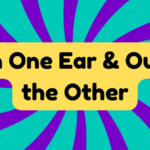"Turn a deaf ear" describes a conscious choice to ignore important discussions. This action can create unresolved conflicts and stifle personal growth. The phrase has origins dating back to the early 1400s, highlighting a long history of willful disregard. People often overlook feedback, criticisms, or pleas for help, contributing to deeper disconnects in communication. This behavior can lead to significant societal issues being overlooked. Understanding this behavior and its implications may lead to more informed interactions.
Synonyms
In the domain of communication, the phrase "turn a deaf ear" indicates a deliberate choice to ignore or overlook someone's words. This silent dismissal reflects a form of purposeful ignorance that can undermine dialogue. Frequently used synonyms capture the essence of this dismissive attitude:
- Close one's ears
- Brush aside
- Ignore
- Pay no heed
- Tune out
These alternatives demonstrate a conscious decision to disengage from discussions, where the impact may lead to deeper disconnects. Understanding these synonyms encourages individuals to recognize the weight of their choices, fostering more informed communication and promoting accountability in interactions.
Example of Sentences
The act of turning a deaf ear has profound implications in everyday interactions. This behavior often signals a refusal to engage with significant conversations, affecting relationships and community dynamics. Consider these situational examples:
- "Turning a deaf ear might lead to unresolved conflicts."
- "Ignoring feedback can stunt personal growth."
- "Refusing to listen may alienate valuable allies."
- "Dismissing concerns overlooks important societal issues."
- "The decision to turn a deaf ear often fosters resentment."
Such idiomatic phrases highlight the consequences of inaction. By recognizing these patterns, individuals can foster a more inclusive dialogue, transforming their interactions into opportunities for meaningful connection.
Origin
The origins of the phrase "turn a deaf ear" can be traced back to the early 1400s, a time when expressions in the English language were starting to take on more nuanced meanings. Within this historical context, the phrase emerged as a powerful metaphor for willful disregard. Its cultural significance lies in how it encapsulates the human tendency to ignore uncomfortable truths or pleas for help. Over the centuries, this idiom has been included in various proverb collections, reflecting not only the language's evolution but also society's challenges in confronting difficult issues. Ultimately, it highlights our ongoing struggle with empathy and awareness.
Collocations
Collocations associated with the phrase "turn a deaf ear" reveal how widespread and versatile this expression truly is in everyday language. The implications often highlight significant themes, particularly in the context of deaf awareness and communication barriers, which remain essential in modern discourse.
- Ignoring concerns
- Dismissing pleas for help
- Overlooking criticism
- Refusing to acknowledge
- Averting accountability
These collocations underscore a reluctance to engage meaningfully, ultimately demonstrating how disregard can lead to heightened conflict and misunderstanding. Understanding these patterns encourages better sensitivity towards others, promoting a more inclusive and responsive communication culture.
How to Use in Everyday Language
Using the phrase "turn a deaf ear" in everyday language often reflects a significant lack of responsiveness to others' needs. Many fall into common misconceptions, believing this expression only applies in serious contexts. However, it frequently surfaces in various everyday scenarios, from family discussions to workplace dynamics. By understanding its usage, individuals can better communicate their willingness to listen.
| Everyday Scenario | Example Statement | Common Misconception |
|---|---|---|
| Team meetings | "The manager turned a deaf ear to us." | It only happens in extreme situations. |
| Family arguments | "Don't turn a deaf ear to my concerns!" | It's only about ignoring big issues. |
| Customer complaints | "They turned a deaf ear to feedback." | It doesn't apply to businesses. |
Why Is It Still Relevant Today?
How does the phrase "turn a deaf ear" maintain its relevance in today's world? In an era marked by pressing social issues, individuals and institutions continue to face communication barriers that hinder meaningful discourse. Often, societal challenges like inequality and environmental concerns are met with indifference; too many choose to ignore urgent pleas for attention. This refusal to engage, symbolized by the phrase, underscores a troubling reality: significant conversations remain deferred or silenced. Today, as innovation endeavors to bridge gaps, acknowledging and addressing the voices that demand to be heard is essential for fostering understanding and driving transformational change in communities.







